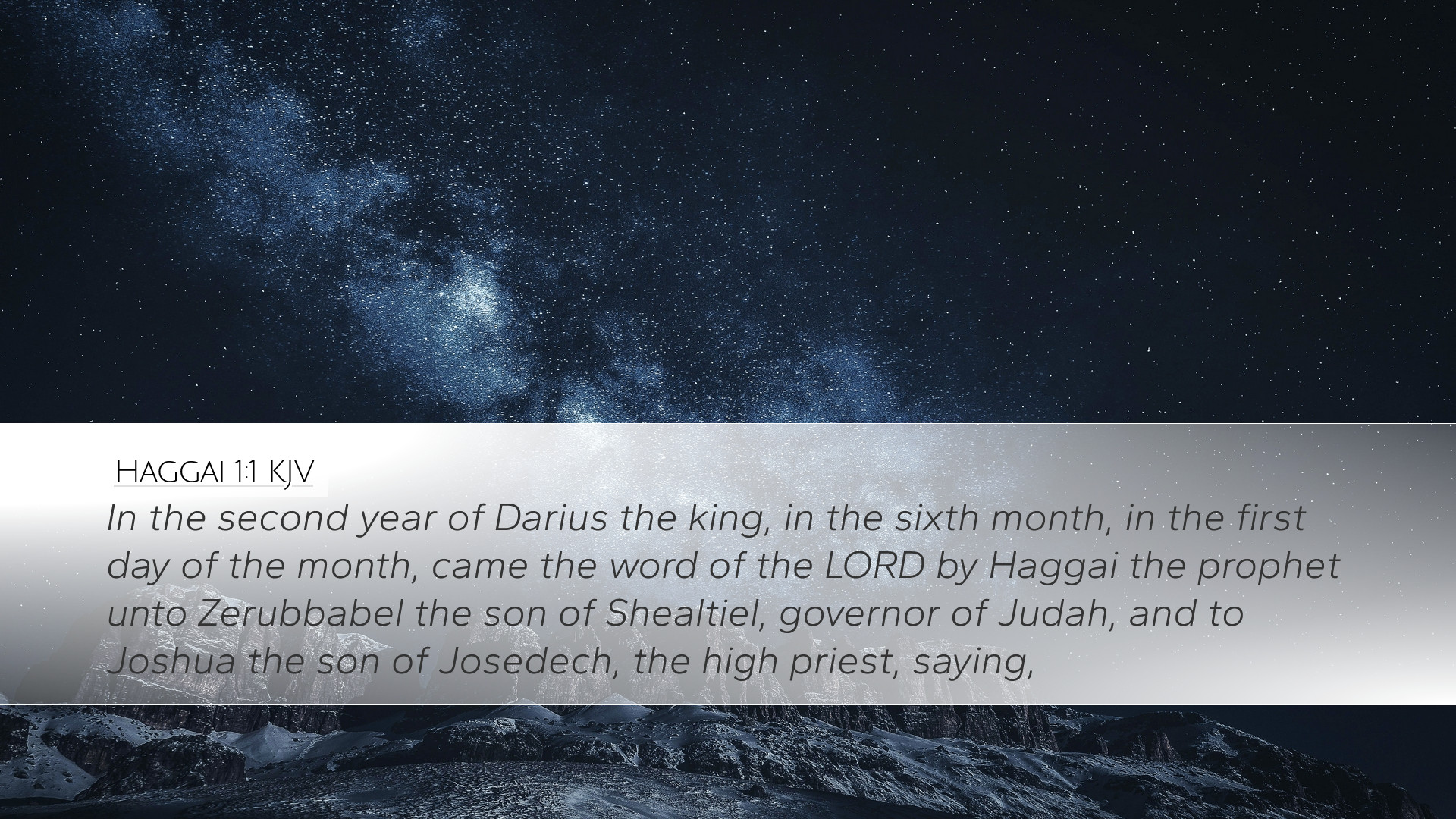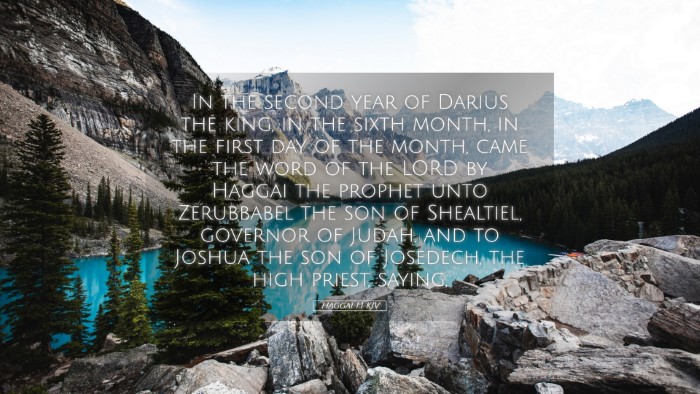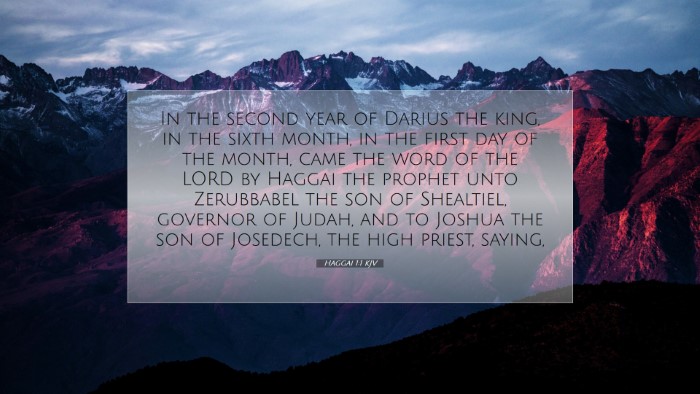Old Testament
Genesis Exodus Leviticus Numbers Deuteronomy Joshua Judges Ruth 1 Samuel 2 Samuel 1 Kings 2 Kings 1 Chronicles 2 Chronicles Ezra Nehemiah Esther Job Psalms Proverbs Ecclesiastes Song of Solomon Isaiah Jeremiah Lamentations Ezekiel Daniel Hosea Joel Amos Obadiah Jonah Micah Nahum Habakkuk Zephaniah Haggai Zechariah MalachiHaggai 1:1
Haggai 1:1 KJV
In the second year of Darius the king, in the sixth month, in the first day of the month, came the word of the LORD by Haggai the prophet unto Zerubbabel the son of Shealtiel, governor of Judah, and to Joshua the son of Josedech, the high priest, saying,
Haggai 1:1 Bible Commentary
Commentary on Haggai 1:1
Haggai 1:1 (ESV): "In the second year of Darius the king, in the sixth month, on the first day of the month, the word of the LORD came by the hand of Haggai the prophet to Zerubbabel the son of Shealtiel, governor of Judah, and to Joshua the son of Jehozadak, the high priest."
Introduction
The opening verse of Haggai sets the stage for this prophetic book, which speaks to a pivotal moment in Israel's history. After the Babylonian exile, the Jews returned to Jerusalem with the task of rebuilding the temple. The timing and context of this message are crucial for understanding Haggai's significance in biblical prophecy.
Historical Context
Matthew Henry emphasizes the importance of the historical setting of this prophecy. After King Darius’s ascension in 522 BC, the people of Judah were in a state of discouragement regarding the rebuilding efforts. The temple’s reconstruction had stalled, reflecting their spiritual apathy and lack of prioritization of God's house.
Albert Barnes notes that the sixth month mentioned corresponds to the month of Elul, which would have been a time of reflection and preparation for the people. This understanding of the timeline indicates God’s imminent call for action.
Adam Clarke further elaborates that Darius' role was significant given that he was a foreign king who authorized the restoration efforts. His mention in Haggai's prophetic message underscores the divine orchestration of historical events leading to Israel's restoration.
The Role of the Prophet Haggai
Matthew Henry points out that Haggai, as a prophet, was a voice of encouragement and a catalyst for action among a demoralized people. His ministry begins with a clear communication of God’s Word, emphasizing the necessity for obedience to divine commands.
Albert Barnes adds that Haggai is noted for his concise and direct messages. This particular verse establishes his credibility as a prophet being the one chosen to deliver God’s instruction. His message aimed at both civil and spiritual leaders demonstrates his understanding of the unity required within the community for rebuilding God’s dwelling place.
The Recipients of the Message
In Haggai 1:1, the specific mention of Zerubbabel and Joshua is important. Matthew Henry states that Zerubbabel, as the governor, represented the civil authority, while Joshua represented the religious leadership. This dual leadership reflects the necessity of cooperating authority in fulfilling God's will.
Adam Clarke indicates that the roles of these two figures highlight God’s intention for rejuvenation not only spiritually but also socially and politically. Haggai's address to both leaders underscores the need for unified action for the restoration of the temple and the community.
Theological Implications
This initial verse conveys several theological insights:
- The Sovereignty of God: Haggai’s message comes in a specific historical context, demonstrating that God is actively involved in the affairs of nations and His people.
- The Call to Action: The word of the LORD signifies a imperative call to the people, urging them to reassess their priorities concerning God’s house which had fallen into disrepair.
- The Importance of Worship: The emphasis on the temple signifies that worship and the communal identity of the Israelites were intrinsically linked to the physical space dedicated to God.
Practical Applications
Albert Barnes contextualizes the message for contemporary audiences, suggesting that just as the Israelites faced periods of neglect regarding their spiritual duties, modern believers must also recognize the potential for complacency in their spiritual lives. The reminder here is about persevering in one's faith and responsibilities.
Moreover, Adam Clarke notes the significance of responding to God’s word and urges believers to examine their own lives and communities: Are we prioritizing God's work? Are we engaged in rebuilding the "temple" of our faith amidst distractions and discouragements?
Conclusion
The opening verse of Haggai serves as a launching point for a renewed vision of God’s purpose among His people. The intertwining of historical context, prophetic leadership, and spiritual responsibility points towards a transformative journey that begins with listening to God’s word. As pastors, students, theologians, and scholars, this analysis invites a deeper engagement with the text, inspiring action and reflection on how we might respond to God’s call in our present circumstances.


